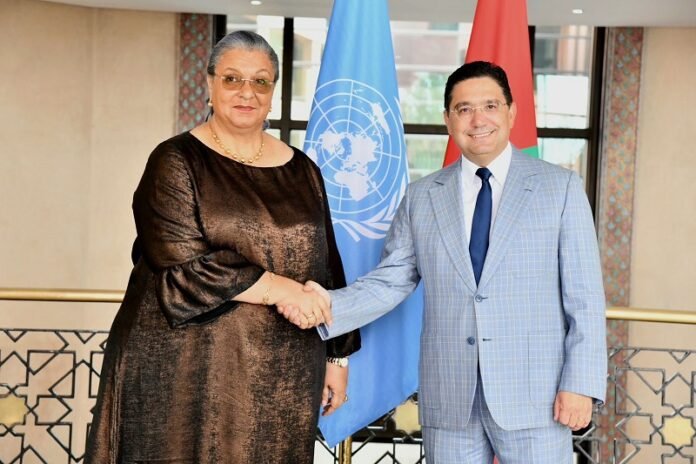The visit of the UN Secretary-General’s Special Representative for Libya, Hanna Tetteh, to Rabat was not just a routine diplomatic stop. It came at a critical time that reaffirms the centrality of Morocco’s role in the Libyan file amid the deadlock of international and regional paths.
In the context of Libya’s ongoing crisis for years, Rabat reemerges as a reliable actor pushing toward a realistic and comprehensive political solution. The visit of the UN envoy and her meeting with Foreign Minister Nasser Bourita raise a clear question: Is the United Nations once again counting on Morocco’s mediation to reactivate the Libyan file, in light of international retreat and internal Libyan divisions?
MFA Nasser Bourita, held talks, today in Rabat, the Head of the United Nations Support Mission in Libya (UNSMIL), Ms. Hanna Tetteh
Morocco renews its support for UN efforts and inter-Libyan dialogue to promote a Libyan-led solution for Libya.@HannaTetteh pic.twitter.com/ub6YOQ1K98— Moroccan Diplomacy 🇲🇦 (@Marocdiplo_EN) August 4, 2025
Tetteh stated after the meeting that “Libya is going through a very sensitive phase,” referencing tensions in Tripoli and a stalled electoral path, but she did not disclose many details about the “new political roadmap” being developed by the UN. This reinforces the assumption that Rabat may be a partner in drafting this roadmap, or at least a platform to prepare the Libyan environment for it.
Morocco: From “Facilitator” to “Strategic Partner”
The paradox is that Morocco does not intervene directly in Libyan affairs, yet it is strongly present in the memory of the political process—from Skhirat to Bouznika, from Tangier to Rabat. This is what led the UN envoy to describe the Kingdom as a “partner” in efforts to reach consensus, not just a facilitator of dialogue.
This shift in terminology reflects a growing international recognition that Libya’s stability cannot be separated from the regional balance that Morocco helps maintain, especially amid tensions in the Sahel and the declining roles of countries that were once active in the Libyan file.
Libya’s Legitimacy Crisis and the Need for a Neutral Mediator
Since March 2022, Libya has experienced a sharp divide between two rival governments, amid a complex scene involving political, military, and tribal dynamics. In this context, the need for a credible mediator has become urgent. Morocco, with its consistent stance on a “Libyan solution from the Libyans themselves,” has preserved its position as a neutral mediator that avoids siding with any party.
But the question remains: Do Libyan parties still have the political will to return to Rabat’s negotiating table? And will any new UN initiative, if it exists, gain internal acceptance and real regional support?
Where Is the UN Heading?
Tetteh’s visit appears to be an implicit acknowledgment that the dynamic launched by the UN in Libya is faltering. Hence, it seeks to reshape a political roadmap—perhaps by building on what was achieved in Skhirat and Bouznika, rather than starting from scratch.
However, the success of any new path depends not only on UN intentions or Moroccan support but also on the existence of a minimal consensus among Libyan forces and a sincere regional will to halt contradictory interventions that have deepened the division rather than resolved it.
Conclusion
Tetteh’s visit to Rabat is not just a protocol event, but a clear indicator that the UN is looking for a trusted partner to revive a fatigued process. Morocco, with its experience and balanced approach, appears ready to play that role again. But success, as past experiences show, will only come if genuine Libyan will and honest regional and international backing are present. Will Rabat mark a new beginning, or just another stop in a series of international hesitations?


